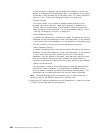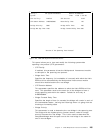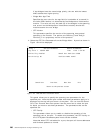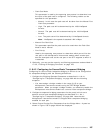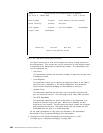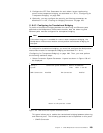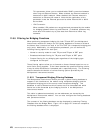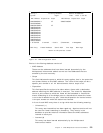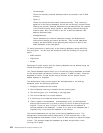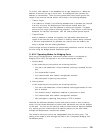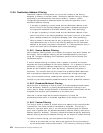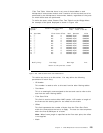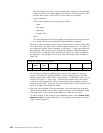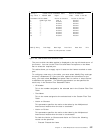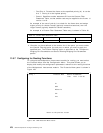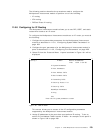−
Permanent($)
These are manually entered addresses which are stored in the FLASH
memory.
−
Static (*)
These are entries that have been entered manually. They cannot be
aged-out of the filtering database, but will be lost during a module
Reset
.
Usually the manually entered addresses are permanent and are retained
in the FLASH memory which results in them being retained during the
module reset. But, if the FLASH is too full to store the address, that
address becomes static.
−
Management(%)
These addresses are internal addresses used by the Multiprotocol
Interconnect module and cannot be altered. They include addresses
used by the Hello BPDU of the spanning tree protocol as well as the
MAC addresses of the LAN ports.
To add a permanent or static entry to the filtering database, select
Add Entry
from this panel. You will then be allowed to enter the following via a pop-up
panel:
•
MAC address
•
Disposition
•
Scope
Permanent or static entries from the filtering database can be deleted using the
Delete Entry
option on this panel.
The
Freeze Database
option allows you to freeze the filtering database and make
all the entries either permanent (if there is space in FLASH) or static. Once the
database is frozen, no new entries may be learned, and no entries may be
added, deleted, or forgotten.
The Multiprotocol Interconnect module will add addresses to the filtering
database under the following conditions:
1.
Bridging
is enabled for the module
2.
Source Address Learning
is enabled for the receiving port
3. The receiving port is in
forwarding
or
learning state
4. The source address is a unicast address
5. A fixed entry for the address does not already exist
6. There is space in the database. If the database is full, the Multiprotocol
Interconnect module will try to find an entry for which its time-to-forget has
expired. If such an entry is found, it is deleted and the new address is
learned (added to the database). If there is no room in the database and a
forgotten
entry is not found the address is not learned.
The learned addresses are not kept in the filtering database forever. The
Multiprotocol Interconnect module keeps track of each learned entry in the
filtering database and deletes it when it has not been used for a specified length
of time. This process keeps the database up-to-date and prevents it from
running out of space.
272 8260 Multiprotocol Intelligent Switching Hub



